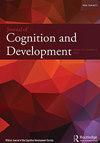I Want to Know about My Train! Factors Driving Children’s Motivation to Learn about Individuals
IF 2.1
2区 心理学
Q3 PSYCHOLOGY, DEVELOPMENTAL
引用次数: 1
Abstract
ABSTRACT Past research has shown that children are more likely to seek out and remember facts about kinds (e.g. “tarsiers hunt for birds”) than individuals (e.g. “this tarsier likes to sing”), underscoring the importance of kind-based information in human cognition. However, children also often care about and learn facts about individuals. What are, then, the circumstances that increase interest in specific facts? Here, we explored whether ownership, familiarity, and entity type influence children’s decision to learn information about individuals over kinds. Specifically, we asked 4- to 5-year-olds whether they wanted to learn new information about a specific item, or about that item’s kind, varying the item’s ownership status (owned by the child, an experimenter, or nobody), familiarity (a familiar or a novel kind), and entity type (animal or artifact) across trials. Children preferred to learn specific information about items they owned, regardless of familiarity or type, and kind-based information about items owned by a stranger (i.e., an experimenter). When asked about items not owned by them (i.e. items owned by nobody or an experimenter), familiarity shaped children’s learning preferences: children preferred to learn kind-based information about novel, but not familiar, items. This study is the first to reveal factors that motivate children to learn about individuals, laying the groundwork for future research on the circumstances that drive children’s learning preferences more broadly.我想知道我的火车!儿童学习个体动机的驱动因素
摘要过去的研究表明,儿童比个体(如“这只眼镜猴喜欢唱歌”)更有可能寻找和记住关于种类的事实(如“眼镜猴捕食鸟类”),这突出了基于种类的信息在人类认知中的重要性。然而,孩子们也经常关心和了解有关个人的事实。那么,是什么情况增加了人们对特定事实的兴趣呢?在这里,我们探讨了所有权、熟悉度和实体类型是否会影响孩子学习个人信息的决定。具体来说,我们询问了4至5岁的儿童,他们是否想了解有关特定物品或该物品种类的新信息,在试验中改变物品的所有权状态(由儿童、实验者或无人所有)、熟悉度(熟悉或新颖的种类)和实体类型(动物或人工制品)。孩子们更喜欢学习关于他们拥有的物品的特定信息,无论熟悉程度或类型如何,以及陌生人(即实验者)拥有的物品基于种类的信息。当被问及非自己所有的物品(即无人或实验者所有的物品)时,熟悉度影响了孩子的学习偏好:孩子更喜欢学习关于新颖但不熟悉的物品的基于种类的信息。这项研究首次揭示了激励儿童了解个人的因素,为未来更广泛地研究推动儿童学习偏好的环境奠定了基础。
本文章由计算机程序翻译,如有差异,请以英文原文为准。
求助全文
约1分钟内获得全文
求助全文
来源期刊

Journal of Cognition and Development
Multiple-
CiteScore
4.00
自引率
0.00%
发文量
29
期刊介绍:
The Journal of Cognition and Development is the official journal of the Cognitive Development Society (CDS). Some CDS members are concerned with basic research or theory; others focus on policy issues and practical applications. The range of interests includes cognitive development during all stages of life, and we seek to understand ontogenetic processes in both humans and nonhumans. Finally, their interests encompass typical as well as atypical development, and we attempt to characterize both biological and cultural influences on cognitive change and continuity.
 求助内容:
求助内容: 应助结果提醒方式:
应助结果提醒方式:


